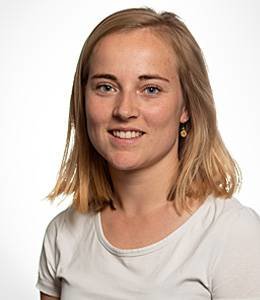TU Delft revolutionizes wheelchair sports with precision power measurements
With just two tiny sensors, no bigger than a two euro coin, we can now measure the power output of wheelchair athletes with an impressive precision of up to 2%. Marit van Dijk, a researcher at Biomechanical Engineering, designed the sensors. This development is unique because in the world of wheelchair sports measuring power is not yet common practice. Usually parameters such as speed, distance and rotation are measured. However, power goes beyond just speed; it also takes into account factors such as wind resistance and inclines, making it a highly objective measure of the intensity of effort. This allows us to accurately track the severity of a workout and determine if and when an athlete needs (extra) rest. These insights could dramatically change the world of wheelchair sports.

Marit van Dijk
Marit van Dijk explains, "Over the past few years, we have performed extensive measurements on a spacious treadmill. Here we carefully recorded the movements of the body and the wheelchair and combined these data with strength measurements and drag tests. This has enabled us to accurately map the actual power output. By comparing this with the estimated powers based on the sensors alone, we were able to validate the accuracy of our estimates."
In wheelchair racing, power estimates must be constantly adjusted because the road surface can change (in off-course training) and wind plays a major role. To provide accurate power estimates in wheelchair racing as well, Van Dijk will conduct field tests in the near future. The knowledge gained during the treadmill tests will of course be integrated into these.
Van Dijk continues: "It would be great if we could have this power information even before the 2024 Olympic Games in Paris. This would allow athletes and coaches to optimize their training and closely monitor the athletes' performance."
The research is part of the overarching "WheelPower" project and is a collaboration between TU Delft, VU Amsterdam and The Hague University of Applied Sciences.
- Watch the interview with Marit van Dijk by TU Delft TV: Sensor-Based Power Meter for Wheelchair Athletes | TUTV Explainer - YouTube
- Read publication: https://edu.nl/w4afv